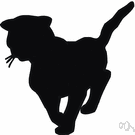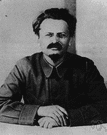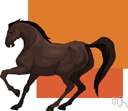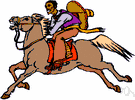trot
Also found in: Thesaurus, Financial, Acronyms, Idioms, Encyclopedia, Wikipedia.
trot
(trŏt)n.
1.
a. The gait of a horse or other four-footed animal, between a walk and a canter in speed, in which diagonal pairs of legs move forward together.
b. A ride on a horse moving with this gait.
2. A gait of a person, faster than a walk; a jog.
3. Sports A race for trotters.
4. See pony.
5. trots Informal Diarrhea. Used with the.
6. A toddler.
7. Archaic An old woman.
v. trot·ted, trot·ting, trots
v.intr.
1. To go or move at a trot.
2. To proceed rapidly; hurry.
v.tr.
Phrasal Verb: To cause to move at a trot.
trot out Informal
To bring out and show for inspection or admiration: "His novel trots out an Irish president named Finn" (Charles E. Claffey).
[Middle English, from Old French, from troter, to trot, of Germanic origin. N., sense 7, origin unknown.]
American Heritage® Dictionary of the English Language, Fifth Edition. Copyright © 2016 by Houghton Mifflin Harcourt Publishing Company. Published by Houghton Mifflin Harcourt Publishing Company. All rights reserved.
trot
(trɒt)vb, trots, trotting or trotted
1. (Horse Training, Riding & Manège) to move or cause to move at a trot
2. (Angling) angling to fish (a fast-moving stream or river) by using a float and weighted line that carries the baited hook just above the bottom
n
3. (Horse Training, Riding & Manège) a gait of a horse or other quadruped, faster than a walk, in which diagonally opposite legs come down together. See also jog trot, rising trot, sitting trot
4. a steady brisk pace
5. (Horse Racing) (in harness racing) a race for horses that have been trained to trot fast
6. (Angling) angling
a. one of the short lines attached to a trotline
b. the trotline
7. informal Austral and NZ a run of luck: a good trot.
8. chiefly Brit a small child; tot
9. (Education) slang US a student's crib
10. on the trot informal
a. one after the other: to read two books on the trot.
b. busy, esp on one's feet
11. (Pathology) diarrhoea
12. (Horse Racing) NZ trotting races
[C13: from Old French trot, from troter to trot, of Germanic origin; related to Middle High German trotten to run]
Trot
(trɒt)n
(Government, Politics & Diplomacy) informal a follower of Trotsky; Trotskyist
Collins English Dictionary – Complete and Unabridged, 12th Edition 2014 © HarperCollins Publishers 1991, 1994, 1998, 2000, 2003, 2006, 2007, 2009, 2011, 2014
trot1
(trɒt)v. trot•ted, trot•ting,
n. v.i.
1. (of a horse or other quadruped) to go at a gait between a walk and a run, in which the legs move in diagonal pairs, but not quite simultaneously.
2. to go at a quick, steady pace; hurry.
v.t. 3. to cause to trot.
4. trot out, Informal.
n. a. to bring forward for inspection.
b. to bring to the attention of others.
5. the gait of a horse, dog, or other quadruped, when trotting.
6. the sound made by an animal when trotting.
7. the jogging gait of a human being, between a walk and a run.
8. a horse race for trotters.
9. brisk, continuous movement or activity: on the trot.
10. Older Use: Disparaging. (a term used to refer to an old woman).
11. Slang. a literal translation used illicitly in doing schoolwork.
12. the trots, Informal. diarrhea; the runs.
[1250–1300; Middle English trotten (v.) < Middle French troter < Germanic; compare Old High German trottōn to tread]
usage: Definition 14, an old-fashioned term, is used with disparaging intent.
trot2
(trɒt)n.
1. a trotline.
2. a short line with hooks, attached to the trotline.
[1880–85; by shortening]
Random House Kernerman Webster's College Dictionary, © 2010 K Dictionaries Ltd. Copyright 2005, 1997, 1991 by Random House, Inc. All rights reserved.
trot
Past participle: trotted
Gerund: trotting
| Imperative |
|---|
| trot |
| trot |
Collins English Verb Tables © HarperCollins Publishers 2011
ThesaurusAntonymsRelated WordsSynonymsLegend:
Switch to new thesaurus
| Noun | 1. |  trot - a slow pace of running trot - a slow pace of running locomotion, travel - self-propelled movement dogtrot - a steady trot like that of a dog |
| 2. |  Trot - radicals who support Trotsky's theory that socialism must be established throughout the world by continuing revolution Trot - radicals who support Trotsky's theory that socialism must be established throughout the world by continuing revolutionradical - a person who has radical ideas or opinions | |
| 3. | trot - a literal translation used in studying a foreign language (often used illicitly) interlingual rendition, translation, version, rendering - a written communication in a second language having the same meaning as the written communication in a first language | |
| 4. |  trot - a gait faster than a walk; diagonally opposite legs strike the ground together trot - a gait faster than a walk; diagonally opposite legs strike the ground togethergait - a horse's manner of moving rising trot - the rider rises from the saddle every second stride sitting trot - the rider sits still in the saddle | |
| Verb | 1. |  trot - run at a moderately swift pace trot - run at a moderately swift pace run - move fast by using one's feet, with one foot off the ground at any given time; "Don't run--you'll be out of breath"; "The children ran to the store" |
| 2. |  trot - ride at a trot trot - ride at a trot horseback riding, riding - travel by being carried on horseback equitation, horseback riding, riding - the sport of siting on the back of a horse while controlling its movements ride horseback - ride on horseback | |
| 3. |  trot - cause to trot; "She trotted the horse home" trot - cause to trot; "She trotted the horse home"walk - accompany or escort; "I'll walk you to your car" |
Based on WordNet 3.0, Farlex clipart collection. © 2003-2012 Princeton University, Farlex Inc.
trot
on the trot (Informal) one after the other, in a row, in succession, without break, without interruption, consecutively She lost five games on the trot.
trot something out (Informal) repeat, relate, exhibit, bring up, reiterate, recite, come out with, bring forward, drag up Was it really necessary to trot out the same old stereotypes?
Collins Thesaurus of the English Language – Complete and Unabridged 2nd Edition. 2002 © HarperCollins Publishers 1995, 2002
trot
nounverb
2. To move swiftly:
bolt, bucket, bustle, dart, dash, festinate, flash, fleet, flit, fly, haste, hasten, hurry, hustle, pelt, race, rocket, run, rush, sail, scoot, scour, shoot, speed, sprint, tear, whirl, whisk, whiz, wing, zip, zoom.
Chiefly British: nip.
Idioms: get a move on, get cracking, go like lightning, go like the wind, hotfoot it, make haste, make time, make tracks, run like the wind, shake a leg, step on it.
The American Heritage® Roget's Thesaurus. Copyright © 2013, 2014 by Houghton Mifflin Harcourt Publishing Company. Published by Houghton Mifflin Harcourt Publishing Company. All rights reserved.
Translations
خَبَب الفَرَسيَخِبُّ الفَرَسيُهَرْوِلُ
klusatklus
traveluntetrav
juosta ravia
kaskati
ügetés
brokkbrokka
速足で駆ける
뛰다시피 걷다
kiaulės kojarisčiarisnoti
klidzinātrikširikšottecētteciņi
pobehovaťrýchly beh
drnec
trava
วิ่งเหยาะๆ
chạy nước kiệu
trot
[trɒt]A. N
1. (= step) → trote m
at an easy trot; at a slow trot → a trote corto
to break into a trot [horse, rider] → echar a trotar; [person] → echar a correr
to go for a trot (on horse) → ir a montar a caballo
to be always on the trot → no parar nunca, tener una vida ajetreada
to keep sb on the trot → no dejar a algn descansar
at an easy trot; at a slow trot → a trote corto
to break into a trot [horse, rider] → echar a trotar; [person] → echar a correr
to go for a trot (on horse) → ir a montar a caballo
to be always on the trot → no parar nunca, tener una vida ajetreada
to keep sb on the trot → no dejar a algn descansar
trot out VT + ADV [+ excuse, reason] → ensartar, recitar; [+ names, facts] → echar mano de; [+ arguments] → sacar a relucir, presentar otra vez
trot over trot round VI + ADV he trotted round to the shop → fue y volvió de la tienda en un santiamén
Collins Spanish Dictionary - Complete and Unabridged 8th Edition 2005 © William Collins Sons & Co. Ltd. 1971, 1988 © HarperCollins Publishers 1992, 1993, 1996, 1997, 2000, 2003, 2005
trot
[ˈtrɒt] vi
[horse, rider] → trotter
(= walk fast) [person] → aller au trot
I trotted down the steps
BUT Je descendis au trot les escaliers.
I trotted down the steps
BUT Je descendis au trot les escaliers.
trot out
vt [+ excuse, reason] → débiterCollins English/French Electronic Resource. © HarperCollins Publishers 2005
trot
n
(= pace) → Trab m; to go at a trot → traben; to go for a trot → einen Ausritt machen; I’ve been on the trot all day (fig inf) → ich bin schon den ganzen Tag auf Trab
(inf) for five days on the trot → fünf Tage lang in einer Tour; he won three games on the trot → er gewann drei Spiele hintereinander
(inf: = diarrhoea) the trots → die Renneritis (hum inf)
Collins German Dictionary – Complete and Unabridged 7th Edition 2005. © William Collins Sons & Co. Ltd. 1980 © HarperCollins Publishers 1991, 1997, 1999, 2004, 2005, 2007
trot
[trɒt]1. n
a. (pace) → trotto
sitting/rising trot (Horse-riding) → trotto seduto/sollevato
to break into a trot (horse, rider) → partire al trotto (person) → mettersi a camminare di buon passo
to go for a trot (on horse) → andare a fare una trottata
sitting/rising trot (Horse-riding) → trotto seduto/sollevato
to break into a trot (horse, rider) → partire al trotto (person) → mettersi a camminare di buon passo
to go for a trot (on horse) → andare a fare una trottata
b. (Brit) (fam) on the trot → di fila, uno/a dopo l'altro/a
three weeks on the trot → tre settimane di fila
to be on the trot (fam) → essere sempre in movimento
the baby keeps her on the trot → il bambino non le concede un attimo di tregua
three weeks on the trot → tre settimane di fila
to be on the trot (fam) → essere sempre in movimento
the baby keeps her on the trot → il bambino non le concede un attimo di tregua
c. the trots (fam) (diarrhoea) → la cacarella
2. vi (horse, rider) → andare al trotto, trottare; (person) to trot in/past → entrare/passare di corsa
trot out vt + adv (excuse, reason) → tirar fuori; (names, facts) → recitare di fila
Collins Italian Dictionary 1st Edition © HarperCollins Publishers 1995
trot
(trot) – past tense, past participle ˈtrotted – verb (of a horse) to move with fairly fast, bouncy steps, faster than a walk but slower than a canter or gallop. The horse trotted down the road; The child trotted along beside his mother.
noun the pace at which a horse or rider etc moves when trotting. They rode at a trot.
ˈtrotter noun a pig's foot.
Kernerman English Multilingual Dictionary © 2006-2013 K Dictionaries Ltd.
trot
→ يُهَرْوِلُ klusat trave traben τριποδίζω trotar juosta ravia trotter kaskati trottare 速足で駆ける 뛰다시피 걷다 draven trave pokłusować correr devagar бежать рысью trava วิ่งเหยาะๆ tırıs gitmek chạy nước kiệu 小跑Multilingual Translator © HarperCollins Publishers 2009